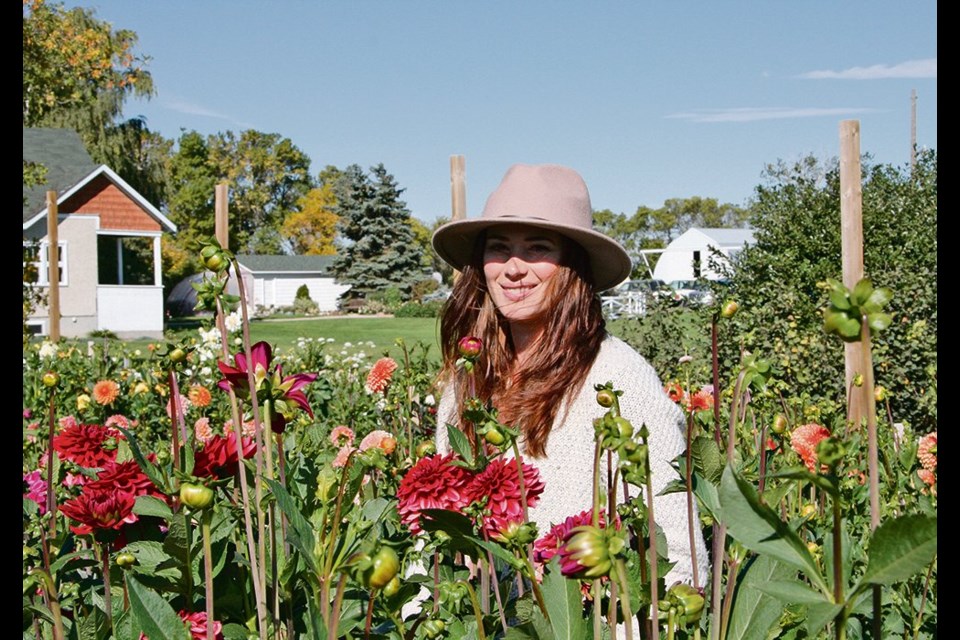DAVIDSON — Tucked in a corner of her parents’ farmyard between the house, a row of grain bins and a vegetable garden lies Rachel Basaldua LePoudre’s passion.
Dahlias.
More than 200 varieties in a wide range of colours and sizes are gloriously blooming on a September day. All of them are neatly labeled and there is enough space to walk the rows of the acre-sized garden and choose exactly the right one.
Next to them is another acre with apple trees — nine varieties from the University of Saskatchewan — and more flowers.
Fieldstone Farm began with Basaldua LePoudre’s search for Café au Lait dahlias for her own wedding bouquet. Floral shops didn’t carry them.
“It’s one of those blooms that’s hard to ship,” she said. “I thought there are probably others like me. I love them so much.”
So, she decided to plant some and offer cut flowers to August and September brides who want to gather their own bouquets.
She began four years ago with just a handful of varieties and not much of a marketing plan other than local buzz.
Signs marked “dahlias” along the grid road between Davidson and Imperial tell potential customers where to find the farm, which is a grain and cattle operation run by her parents Joanne and Daniel LePoudre and her brothers.
People come out to the farm typically on Sundays to cut their flowers, enjoy some time outside and, when the apples are ready, take some fruit home too.
Besides the dahlias there are cosmos, amaranth, Queen Anne’s lace, feverfew, grasses and snapdragons to fill out bouquets.
It’s a lot of work, but a labour of love for someone who has had a passion for flowers her whole life.
Basaldua LePoudre’s mom always had large flower beds and she worked in greenhouses while in school.
She studied biology at university and has spent the last several years working with her husband Juan Manuel, whom she met while taking riding lessons and training retired racehorses to play polo at their property near Saskatoon.
Once or twice a week she travels to the farm to weed and water.
Although she owns nearby farmland — with the large rocks that led to the farm name — the flower farm was established where there was a good well and protection from the wind. She and her husband hope to eventually establish a farm together but for now the flowers will grow where they are.
Basaldua LePoudre said the climate is the biggest challenge, as it is for all farmers.
“I wish we were Zone 4 so much,” she said, referring to the plant hardiness ratings. “But I am surprised how many things we can grow. It’s either too windy or too hot. It’s always an extreme.”
The hot dry summer of 2021 meant hauling water, even with the available well.
“It was steady,” she said.
Later season rains were a godsend for developing the dahlia tuber systems under the ground.
“There should be lots to harvest for next year,” she said.
Fall dahlia harvest begins after a frost and involves carefully digging and lifting the tubers from each plant with Juan Manuel’s help. They will be inventoried, labeled and stored in vermiculite in crates stacked to the ceiling in her mom’s cold storage room.
“Vermiculite seems to wick the excess moisture and not take so much away that they shrivel on me,” she said.
The winter plan is to get a website so she can sell extra tubers in the spring. Planting will begin again around May 1.
This fall, tulip and daffodil bulbs went into the ground so that flowers will be available earlier in the season. And there will be more dahlias, she said.
Beginnings of the apple orchard
The apple orchard began about seven or eight years ago when a neighbour offered up some trees.
“He said if I dug up the extra root stock I could keep it, so I took it all,” Basaldua LePoudre said. “His wife came and taught me how to graft the bud wood from the U of S.”
The trees yield well and although most of the apples are sold locally, she once had so much production that she took it to a larger operation to sell.
Value-adding to the apple crop isn’t yet on the agenda.
“For now, I would like people to enjoy coming out and picking apples off the tree, being in nature and selecting their food,” she said. “It’s good for the soul, for your well-being.”
Brides who want to choose their own flowers are encouraged to pre-book and come two days before the wedding to get the blooms. The flowers have a good five days of vase life once cut.
Basaldua LePoudre does the cutting.
“They choose their colour palette and I’m selecting what’s looking good,” she said.
Other customers are generally locals who come out to choose a bouquet for themselves and a bag of apples to eat.
She said the most popular dahlia varieties this year were Jowey Winnie and Linda’s Baby, which feature softer pinks with orange undertones. These are often paired with terracotta or burnt orange-coloured varieties to compliment the pink.
Another trend is the shift toward more of a wildflower feeling to bouquets. She said customers forage for things like wild wolf willow or even dill and add them to the flowers.
“I have no problem with people who want to mix, especially because they tend to find these locally and have a smaller environmental footprint,” said Basaldua LePoudre.
This year she branched into event design for her brother’s wedding and a garden party, using antique dishes and décor, and said someday she hopes to offer complete event packages.
For now, she said she will focus a little more each year on her business and see what happens.
“We will never totally leave the horse side behind,” she added.
Readers can find Basaldua LePoudre’s business on Instagram @Fieldstonefarmsk.

